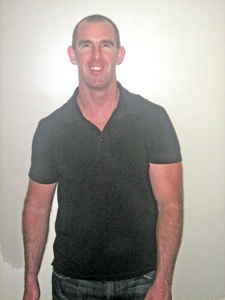health & sports
Out on the Field
Gays, athletes and the NCAA
Published Thursday, 29-Nov-2007 in issue 1040
In the high-finance, testosterone-laden world of the National Collegiate Athletic Association (NCAA), being gay isn’t exactly a Wonka golden ticket to success.
In fact, it can be quite the opposite.
But times, they are a changin’.
While there is, at present, no known “out” athlete currently participating in what, for the purposes of this column, we’ll call “a major team sport,” like football or basketball, at the Division I level, there have been and continue to be athletes in other sports, such as track and field, who are open about their sexual orientation.
How do we know?
We know, in part, because Paul Tontz has interviewed them. Tontz is a Ph.D. candidate who is conducting a study on gays in Division I athletics.
According to Tontz, the study explores whether gay male athletes come out of the closet or remain invisible to their teammates and coaches. By interviewing athletes from across the country, Tontz also hopes to identify the factors that play a role in those decisions.
Tontz says he’s hopeful the information he learns will be useful for college administrators, coaches and faculty to provide a means of support and encouragement for their gay student athletes.
In today’s NCAA, for some gay student athletes, coming out can mean the revocation of important scholarship money by their school; it can lead to such ostracizing by teammates that one might feel forced to quit; and for coaches and administrators, coming out can lead to constant rumors and accusations that can stifle or even end a career.
Since the vast majority of Division I schools are publicly funded, an unfriendly sports environment for gay athletes would seem out-of-step with state laws against discrimination. But it isn’t a question of laws. While most schools in the NCAA have policies that protect gay and lesbian students and athletes, they can’t force acceptance or a change in long-held Bible-belt beliefs. Perhaps that’s because of the hyper-masculinized environment of full-contact competition, or the perception of a vulnerable and sexually charged atmosphere in a locker room. But whatever the reason, the environment for a gay male athlete in a major college sport is anything but friendly and welcoming.
Through the course of this project, Tontz has interviewed only five gay male athletes from schools across America in a variety of different sports. All but one (the only one who participated in a full-contact sport) was open about his orientation with his teammates.
While Tontz commends those he’s interviewed who are openly gay, he feels he needs more respondents who are closeted to round out the study. He would also prefer they be in full-contact, major NCAA sports.
But it’s a bit like finding a needle in a haystack. Common sense dictates that these athletes exist. There have been professional ball players from each major professional sport come out of the closet after their playing careers ended. They each had played their professional sports at the NCAA Division I level and were closeted when they did.
Unfortunately for Tontz, there isn’t exactly one centralized meeting place on the information super highway for closeted college ball players. As a result, Tontz has had to become a kind of Indiana Jones, unearthing his finds at great expense.
“I’ve flown to cities and met with athletes and paid for hotel rooms and flights,” he says.
Tontz said that while he does have difficulty finding gay athletes for his study, he says he has met a few who identify as bisexual. In a future study, Tontz said he would like to include bisexual athletes, but at this time his primary focus is on the question of what factors determine whether a gay athlete is closeted, or comes out.
When Tontz completes his work, the information will certainly be interesting. That may explain why the NCAA has provided a small grant to help with expenses and travel.
“They really have been great,” he said.
To date, he can’t share his results, but he did tell me that some of the information he’s learned surprised him.
An athlete, Tontz was inspired to dive into this research because of his own experiences.
“I’ve always been involved in sports, even as a little kid,” he says. “I’m not sure if my parents pushed me because they suspected I might be gay and wanted to masculinize me or not, but I’ve always loved competition and being a part of a team.”
An avid volleyball player and weightlifter, Tontz admitted that there have been critics of his research, some even going so far as to suggest it is nothing more than a carefully constructed ruse to pick up on college athletes.
I, for one, would love to see his research published. As a former Division I college athlete in a major sport, I didn’t even know I was gay, or really question it at the time, but nearly 15 years now removed from that experience, I can’t imagine I was the only Aggie in 1992 who prefers a more masculine bedtime companion.
This research is important, as illustrated by the hate speech coming out of San Diego State University’s student-run underground newspaper just three weeks ago. Gays still have a tough time on campus, and a better understanding of the challenges can only help, especially in the locker room.
If you want to participate in the study, or if you know a gay athlete currently in a college program, e-mail Paul Tontz at ptontz@du.edu, or forward his e-mail along. The more respondents, the better the research.
|
|
Copyright © 2003-2025 Uptown Publications


